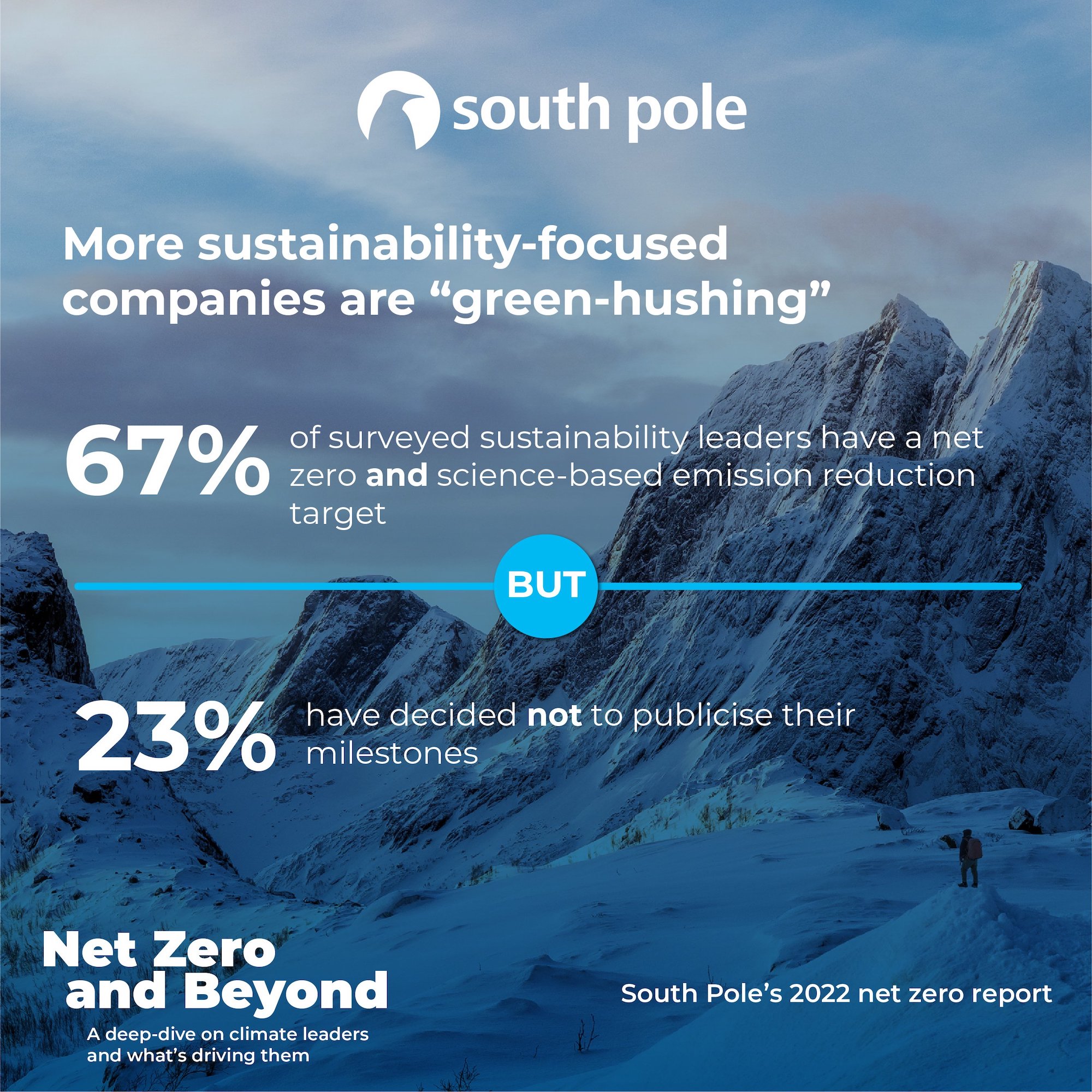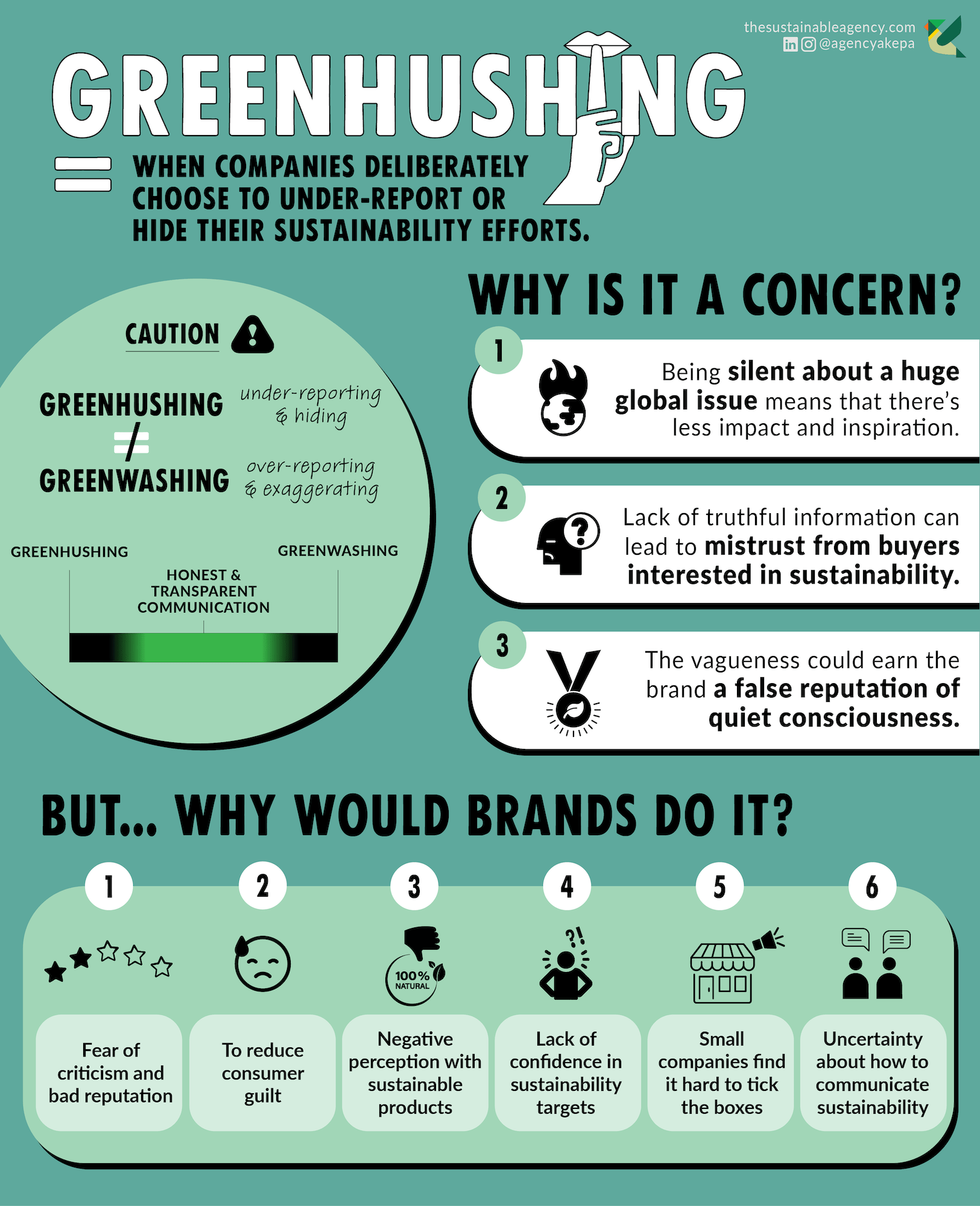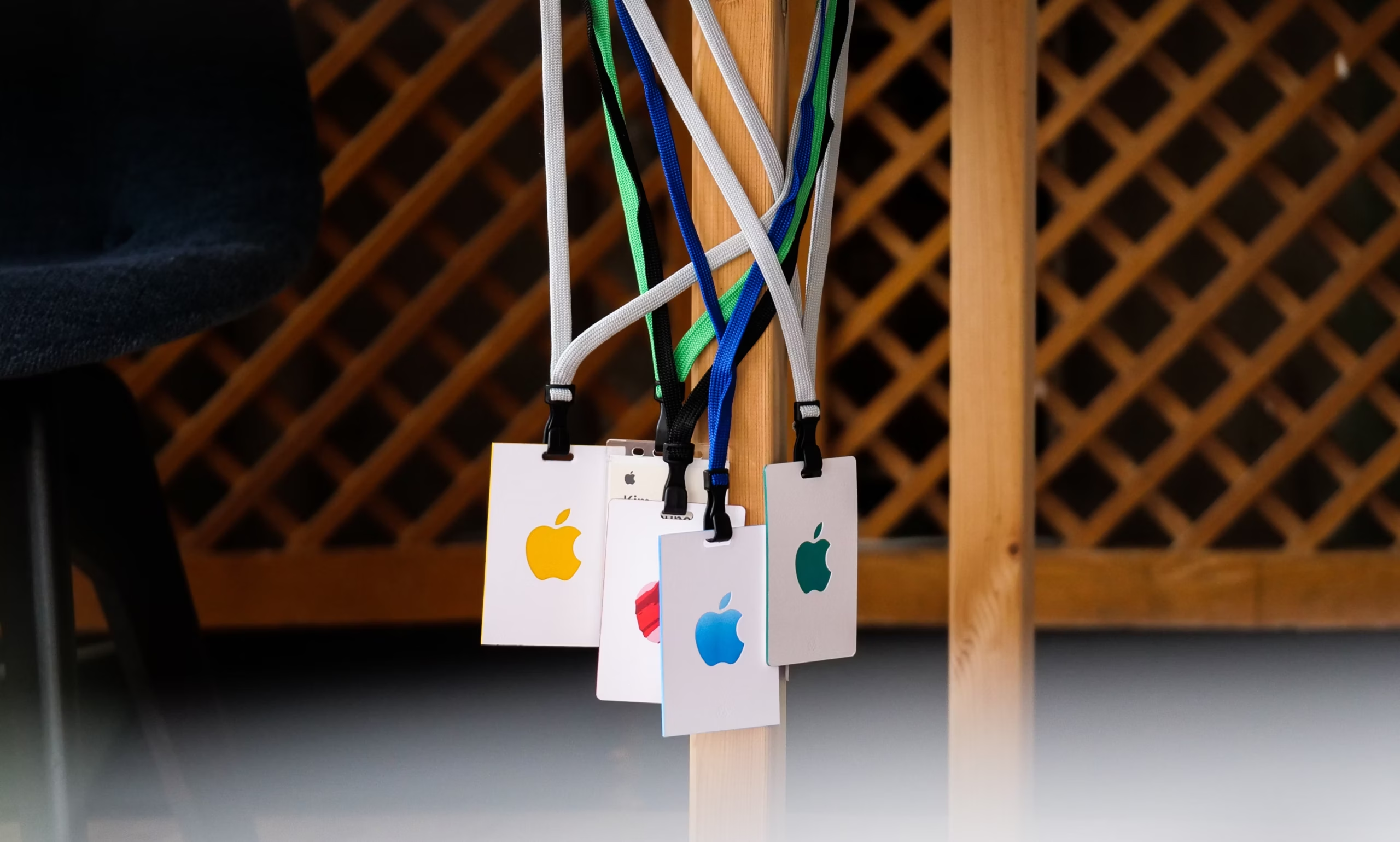Yes, another term in the blizzard of sustainability that’s relevant for you to look out for. Whether you’re running a sustainable business, or you work in marketing, or you’re someone who’s just curious about the way brands communicate to the rest of the world.
Either way, our guess is that you’ve definitely heard of greenwashing. The term has been around since 1986 and has been increasing its notoriety for years now. Such widespread knowledge surrounding greenwashing means that brands are being called out for it, almost every week. It’s mainly due to this fear of criticism against sustainability claims that brands have begun greenhushing. Greenhushing was coined more recently, in 2008 by brand strategist Jerry Stifelman and writer Sami Grover in a blog post (now inaccessible) for Treehugger.com.
Greenhushing is when companies choose to not communicate their sustainability efforts.
Apparently, greenhushing is more common than we think and companies have felt the need to go quiet about their sustainability for a while now. Back in 2016, a study of 31 small rural tourism businesses in the Peak District National Park (UK) who are all certified by the Environmental Quality Mark found that they only communicated 30% of the sustainability actions they practised. But it was thanks to the consultancy South Pole that the term gained widespread coverage. Their report in late 2022 on large organisations that have a dedicated sustainability or CSR lead found that 67% have a net-zero target and a science-based target but 23% do not plan to publicise their science-based emissions goals.
Greenhushing vs greenwashing
Greenhushing should not be mistaken for greenwashing. And greenhushing is also not a type of greenwashing, although some people think so. In fact, it’s more accurate to say they’re the opposite. While greenwashing deliberately exaggerates a company’s sustainability claims to mislead people to think that they are more sustainable than they actually are, greenhushing deliberately under-communicates a company’s sustainable practices. So by definition, they’re the inverse of each other. Both are, however, ways that a company is inauthentic about its sustainability. So in a way the two concepts are like a mirror image.
So, why are brands greenhushing?
There’s a lot of talk on this. Here are a few of the chief motives that could be at play:
- The fear of being criticised and getting a bad reputation. This is the most obvious reason. No brand wants to be ‘cancelled’, called out for greenwashing, or publicly shamed for being hypocrites or not doing enough for sustainability. Before, mentioning sustainability would elicit a positive response. Now, not mentioning any sustainability practices at all can protect businesses from people who might criticise them – and interpret their statements as hypocritical. Plus, apart from being cancelled, there’s also the growing threat of greenwashing lawsuits that might add even more fear.
- To reduce customer guilt. The 2016 study mentioned earlier on the tourism businesses in the Peak District National Park suggested that greenhushing results from low moral intensity. Greenhushing downplays complex and urgent issues surrounding sustainability and perhaps some brands would just overall avoid the topic to protect customer happiness. Why would brands willingly say something that might make a customer feel guilty or like they’re not doing enough?
- There’s a negative perception of sustainable products. Products that are marketed as natural are sometimes considered lower quality. For example, many people are sceptical about natural cleaning products, deodorants, and makeup products working as well as the not-so-sustainable classic versions.
- Companies are not confident they’ll meet their goals. According to the South Pole report mentioned earlier, a possible motivation for greenhushing is that companies are unsure that they have what it takes to meet their goals. Or perhaps they want to wait a while to test the impact of measures before announcing a plan that turns out not to be feasible (and essentially greenwashing).
- There’s pressure on smaller companies. As a small company, it can be difficult to cope with the demands of sustainability reporting. It’s also getting more expensive to acquire sustainable certifications and some companies might not be able to afford them. They’d rather not say anything at all if they know they can’t give buyers what they’re looking for.
- Companies are unsure when or how to communicate sustainability efforts. Do you announce a sustainability effort right before it goes into practice? Or if a part of your supply chain has it in practice? Or when it’s fully implemented and there’s a substantial impact? With all these nuances, there’s a lot of room for criticism.
Why is greenhushing bad?
Jerry Stifelman – who helped coin the term – says himself that greenhushing is as bad as greenwashing. And many would agree.
For starters, being shy about sustainability efforts equates to being silent about a huge global issue. For the biggest impact, everyone and every brand should be talking about sustainability and what part they’re playing to create less harm to the planet and people. Brands can be inspired by others leading the way and altogether create a ripple effect.
Another issue is that many people are looking for any sustainability efforts that brands are taking. Customers should be as informed as possible in order to make the right purchase decisions.
Some people also believe that greenhushing is a type of greenwashing, by hiding under the guise of being “quietly conscientious”. Because companies are vague about their sustainability, some people might be fooled to believe that they are more sustainable than they actually are.
We made a little infographic:
Greenhushing case study: Apple – from loud to shy on climate
At Apple’s 2025 ‘awe dropping’ product event, something was missing. In past years, the company proudly announced bold initiatives, like “our first carbon neutral Apple Watch” and even staged the viral Mother Nature skit to bring its climate commitments centre stage. This time round, sustainability was reduced to a whisper. You had to really pay attention to notice it at all.
No products were declared carbon neutral. Environmental messaging was reduced to quick, perfunctory mentions of recycled aluminium and titanium. Yet on Apple’s website, each product page still details steps to cut virgin materials, prioritise renewables, and progress towards its 2030 net zero target. The work continues – but under the radar.
Perhaps a recent case in Germany, which banned Apple from using the term ‘carbon neutral’ for its Apple Watches (we’d say rightly so), is a factor in the sweeping silence. In a way, a form of huff. Others believe that appeasing politicians is part of the plan.
We’re not sure. But whatever the reasons, this shift is a textbook example of greenhushing: maintaining environmental action while pulling back on the publicity. Apple isn’t alone. A UK survey found half of businesses have “dialled back” external sustainability messaging, and not always due to political pressure. Still, Apple’s silence raises questions. If one of the world’s most influential brands won’t talk openly about sustainability, how can other companies be expected to follow suit?
The issue may seem complex but at Akepa we believe that finding the fine line between greenhushing and greenwashing is not that difficult. There are some key ways to still speak about sustainability without nerves or self consciousness.
So how can brands avoid greenhushing?
The reasons for all this circumspection may be understandable. But greenhushing is not the solution. The inevitable consequence of greenhushing will be a lack of corporate sustainability. It would be a pity if the fear of criticism was the leading reason that financial, intellectual, and emotional investment in sustainability started to diminish. With all the hype around greenwashing, brands should instead take a more positive approach:
- Be accurate. What can go wrong if you talk about specific details confidently? The answer is nothing. So instead of embellishing those details with over-zealous grandstanding like ‘carbon neutral’ – just say exactly what you’re doing. And feel free to do that loudly.
- Be transparent. Little steps are appreciated, if customers can see that actions within a company are genuine and not contradicting. For example, if you’re a small business, don’t worry about not having enough means for a big certification like B Corp. There are other ways to show true sustainability off: try a behind-the-scenes, be transparent about your supply chain, or show how your business is circular.
- Admit imperfection. Some brands deserve criticism. But others should be confident enough to talk the walk if there aren’t any fair reasons for major backlash, while also admitting imperfection. Yearly sustainability reports that admit faults and describe meaningful improvements can help.
- Let the laws do the talking. Stricter laws against greenwashing are coming but they should only punish those who are actually greenwashing. If that’s not you, then don’t be stricken by panic and retreat into a shell.
- Choose your partners carefully. A good agency, for example, should know how to communicate sustainability and avoid the pitfalls of either greenwashing or greenhushing. Quite a few of the most egregious greenwashing cases have been committed by clumsy marketing teams that don’t know the area.
Perhaps there is also a lesson for the people looking on too. If we do want a more sustainable world then we need to understand that sustainability can’t happen overnight. A transition needs to happen from a far from perfect place.
Of course it’s still important to call out greenwashing brands but not all brands deserve to be scolded. It’s a fine line, and we need to tread it carefully. We just hope that greenhushing won’t interrupt those with grand plans over the coming years.






Leave a Reply